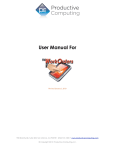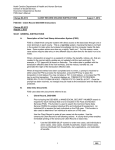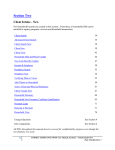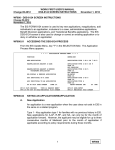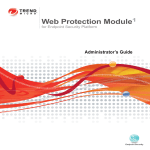Download Section 104
Transcript
Change #6-2010 WORK FIRST The Application Interview December 1, 2010 104 – THE APPLICATION INTERVIEW Change #6-2010 December 1, 2010 The caseworker has determined that the family is not a candidate for Benefit Diversion or the family has declined the offer to apply for Benefit Diversion before the application interview begins. Advise the applicant that by applying for Work First Family Assistance (WFFA) they are also applying for Medicaid. The caseworker will advise the applicant that any information provided as a part of their application for WFFA will automatically be used as part of their Medicaid application, including citizenship status, immigration status, identity and social security numbers. The caseworker must ask if the applicant wishes to continue with the WFFA application or if there are individuals in the household who only want to apply for Medicaid. Document the applicant’s decision of whether or not to apply for Medicaid for those individuals. The caseworker is now ready to proceed with determining eligibility for WFFA. The family and the caseworker have discussed personal responsibility and have signed the Mutual Responsibility Agreement. (See Section 103, Personal Responsibility) The additional requirements to be assessed are: • • • • • • • • • • • • • • • Individual Criminal Violations Substance Abuse Initiative Family Violence Option Whether the family has exceeded its time limit(s) (If so, the family may apply for an extension or for hardship status. See Sections 105 and 105A.) Whether there is a child subject to the Family Cap in the Family Unit Minor Parent Rules Residence Age Rule for the Children Rule for applying for Social Security Enumeration Citizenship / Qualified Immigrant Status Identity Kinship and Living With Requirement Income and Needs Resources Job Quit There are certain rules that apply as to who in the family must apply and who may choose to apply, as well as whose income and resources must be counted. The basic rules are defined below and must be applied when evaluating whether the family is eligible to receive Work First Family Assistance (WFFA). Do not request citizenship, immigration status, and/or social security number for individuals who are not applying for assistance. I. APPLYING FOR WFFA A. Biological or adoptive parents and stepparents may apply for assistance for a child(ren) and must be included in the payment for the family, unless they are ineligible, or disqualified from the program. (See Section 112, Kinship/Living with Requirement). B. Certain other relatives of a child(ren) may apply for assistance on the children’s behalf but cannot be included in the payment for the family. (See Section 112, Kinship/Living with Requirement). C. Non-relatives may apply for assistance on behalf of a child(ren) if they have legal custody 1 104 WORK FIRST The Application Interview Change #6-2010 December 1, 2010 or legal guardianship of the child(ren). These adults can not be included in the payment for the family. (See Section 112, Kinship/Living with Requirement). NOTE: D. II. Legal custody or legal guardianship can only be established by a court document signed by a Judge or other Officer of the Court. A notarized statement is not sufficient. WFFA is not provided to pregnant women unless they have other eligible children in the home and meet all other eligibility requirements. REQUIRED FAMILY UNIT MEMBERS A. B. C. The following individuals are required to be included in the Work First family unit if they live in the home. This may include individuals who are temporarily absent from the home. See Section 112, Kinship/ Living with Requirement. 1. Children: All minor brothers and sisters, half brothers, half sisters, stepbrothers and stepsisters. (This includes a child who is subject to the family cap.) 2. All parents and stepparents of the child(ren) who are required to be included. a. A minor parent is considered a child and can not be case head/payee for a WFFA case. (See Section 107, Minor Parent Rules) b. If both the adoptive parent and biological parent live in the home with the child(ren), only the adoptive parent can be included. c. When two parents have a mutual child(ren) the entire family is considered one family unit. Parents with a mutual child living in the same household cannot receive WFFA in separate cases. If the family is ineligible for WFFA, evaluate the family members for the appropriate Medicaid programs. The following individuals may be included if they apply, choose to be included, and meet the requirements. 1. A parent (or stepparent) may choose to apply for WFFA when the only child(ren) receives Supplemental Security Income or adoption assistance. 2. Children other than siblings, stepsiblings and half-siblings may be included when they meet the Kinship Requirement (See Section 112, Kinship/Living with Requirement).However, if a child has countable incomes discuss the impact that the child’s income will have on the WFFA payment amount. Once the caseworker identifies all required family unit members, the case worker must determine if there are individuals that need to be excluded from the case due to individual ineligibility. The following individuals can not be included in the WFFA case: 1. An adult relative caretaker (other than a parent or stepparent) can not be included in the WFFA case. NOTE: Adult caretakers (other than parents or stepparents) may be eligible for Medicaid even though they can not be included in the Work First 2 104 WORK FIRST The Application Interview Change #6-2010 December 1, 2010 payment. You must evaluate each adult caretaker for Medicaid eligibility. See the Family and Children’s Medicaid manual. III. 2. SSI recipients can not be included in the WFFA case. 3. Children for whom foster care or adoption assistance payments are being made can not be included in the WFFA case. 4. Incarcerated or institutionalized individuals can not be included in the WFFA case. See the Family and Children’s Medical manual. 5. Individuals who do not meet the Citizenship/Qualified Immigrant rule may not be included in the WFFA case. Also they are not required to provide or apply for a Social Security number. (See Section 111, Citizenship/Immigrant Rules) 6. Any child who does not meet the Kinship/ Living With Requirement. (See Section 112, Kinship/Living with Requirement). 7. Parents who fail to cooperate with child support enforcement are not included on the case in the Eligibility Information System (EIS), as the result of the non-coop sanction. When the parent(s) are determined to be ineligible, evaluate the parent for eligibility in other Medicaid aid program categories. See the Family and Children’s Medical manual. THE BUDGET UNIT The Budget Unit includes everyone who is in the family unit plus any other individuals that live in the home and are financially responsible for any family unit members. The following are included in the budget unit: A. Everyone who is in the family unit B. A parent or stepparent who does not meet the citizenship/qualified immigrant rule. The parent or stepparent is not required to provide or apply for a Social Security Number. (See Section 111, Citizenship/Immigrant Rules) Non-family unit members, who are included in the budget unit are still required to provide information to determine eligibility, this information includes but is not limited to wage information. Non-applicant budget unit members are not required to provide a social security number, immigration status or citizenship status. C. IV. A child is not included in the family unit when the parent/caretaker fails to apply for the child’s social security number. RIGHTS AND RESPONSIBILITIES A. Explain to each applicant that they have the following rights: The right to: • • • • Apply for assistance and reapply at any time if you are found ineligible. Have anything you tell us kept private. Withdraw from any assistance you get at any time. Get a written notice of any information needed to determine your eligibility 3 104 Change #6-2010 • • • • • • • • B. December 1, 2010 Ask for help from the county in getting the information needed to determine your eligibility. Be protected by federal law against discrimination on the basis of race, color, national origin, sex, religion, age, disability, or political beliefs. Gets a notice telling you why your application is denied, if it is denied. Apply for retroactive Medicaid for up to 3 months prior to your date of application. Receive your monthly check until the payment is terminated or withheld by appropriate action. Use your check however you want, as long as it is in the best interest of your family. If you do not use your check correctly, another person may be appointed to get your check and use it for you and your family. Not have a permanent address as long as you plan to stay in North Carolina. Ask for a hearing from the department of social services if: • Your application was denied, and you think the decision was wrong. • You believe your assistance is wrong based on the county's use of State or local regulations. • The county does not take action on your Work First Family Assistance application within 45 calendar days. • Your assistance is changed or stopped, and you think the decision was wrong based on State or local regulations. Explain to each applicant that they have the following responsibilities: • • • • • • • • V. WORK FIRST The Application Interview Help your case manager develop a Mutual Responsibility Agreement and Plan of Action. It is also your responsibility to carry out the agreed upon actions. Provide the Department of Social Services information requested by the date due so that your eligibility can be determined as soon as possible Apply for other benefits that you are entitled to, such as Social Security, Unemployment or Veterans Benefits. Let your caseworker know of any changes in your situation within 10 days. Report changes in your address, employment, property, resources, expenses or needs, or who lives in your home. If you expect a child to be away from your home longer than 90 consecutive days, you must report the child’s absence within 5 days of knowing this change. If you do not, your check will be reduced or terminated. This child is no longer eligible for cash assistance unless he has good cause for being absent from your home. Let your caseworker know immediately if you get more Work First Family Assistance than you are supposed to. Tell the truth. It is against the law to make false statements or to willfully withhold information. If you do not tell the truth, you can be taken to court and charged with fraud. Everything you tell the department of social services will be checked by them and, perhaps, by a State or Federal reviewer. Your medical records may need to be reviewed by the department of social services. By signing your application, you agree that these records may be reviewed. Allow the State to bill the medical insurance of anyone who receives Medicaid benefits. You also agree that, if you get a payment from an insurance company for a bill that Medicaid paid, you will repay the State for the Medicaid payment. You also agree to report to the department of social services if anyone in your Medicaid case receives medical care for an injury resulting from an accident. SUMMARY OF VERIFICATION REQUIREMENTS At application, the caseworker must verify each condition of eligibility following the policy in this 4 104 WORK FIRST The Application Interview Change #6-2010 December 1, 2010 section. For many elements of eligibility, the applicant's statement is acceptable verification. Verification requirements at review or change in situation may be different from those at application. For verification requirements at review or change in situation, see the manual sections that apply to each eligibility factor. A. VERIFICATION REQUIREMENTS There is no specific time frame by which the caseworker must request verifications from an applicant or third party. However, do not deny a Work First application for failure to provide information without allowing the applicant or third party at least twelve calendar days to provide it. If the family has not requested extra time to take needed actions or acquire required verifications by the deadline set, Work First may be denied as early as th the day after the deadline (no sooner than the 13 day). As a reasonable accommodation, individuals with disabilities are entitled to additional time and/or assistance with obtaining needed information. All families should be informed of the rights of individuals with disabilities to receive such assistance. Exception: When the only information needed to process the application is verification of citizenship and/or identity the caseworker must notify the applicant. Even though this information may have been included on the initial DSS-8146A, a second DSS-8146A must be forwarded to the applicant notifying them of the last information needed to process the application. The caseworker must hold the application open for up to six months (see Section 130-lll. D) If the DSS worker denies the Work First portion of the application, the worker must continue to process the application as a Medicaid application for the family members. In order to deny a Medicaid application due to information not being provided, there must have been at least two requests for the information (with 12 calendar days between the requests). When the DSS worker denies a Work First application, always consult the Medicaid manual to determine the proper disposition of the Medicaid portion of the application. 1. The following information may be verified at application by either the family’s statement or third party verification, if questionable: • • • • • • • • 2. Age: The caseworker may verify the child’s age by applicant’s statement at application. If a child’s age was verified by the applicant’s statement at application, obtain third-party verification at review. (See Section 109, Age Rule for Children.) School attendance for minor parents Kinship (Exception: Third party verification is required for legal custody or legal guardianship.) Living with a specified relative or legal guardian or custodian Resources Earned income Unearned income Social Security number when the applicant knows the number. (Non applicants are not required to provide a social security number, immigration or citizenship status) A signed and dated intake/information form, such as the DSS-8228 (WFFA Documentation Workbook), or a county-developed intake form can serve as documentation of the applicant’s statements and must be maintained in the case record. 5 104 WORK FIRST The Application Interview Change #6-2010 December 1, 2010 Counties are strongly encouraged to use the DSS-8228. However, if an agency chooses to use an alternate form, the agency must ensure that the alternate form includes all eligibility criteria, provides the applicant with all required notices and complies with Title VI of the Civil Rights Act and the Americans with Disabilities Act as outlined in the DSS-8228. If an applicant’s statement is a range, such as a bank account of $200 to $350, determine the mid-range and accept that amount. If the mid-range results in ineligibility but the lower range does not, the caseworker should consider pursuing third-party verification or requesting that the applicant provide thirdparty verification. NOTE: 3. The following Work First Family Assistance elements always require third party verification: • • • • • • • • • • • • B. Special attention should be given to re-applications in which third party verifications were not obtained at previous applications. Incapacity of a parent or step parent when used to support the Family Status code of I. Qualified immigrant status Rebuttal value of resources. Enumeration when the applicant does not know his/her number or the number of another family unit member, who is applying for benefits, or they do not have a number The felony status of individuals convicted of Class H or I controlled substance felonies (in order to include them in the need standard). Completion of substance abuse screening for each adult in the family unit. Filing for Unemployment Insurance Benefits (UIB), if monetarily eligible and not exempt Verification of questionable statements. See instructions in the appropriate manual section. Verification of legal custody or guardianship of non-relative /adult caretaker payee cases U.S. Citizenship (for individuals who have declared themselves to be U.S. citizens) Identity Residence INSTRUCTIONS ON USING THE DSS-8146A, NOTICE OF INFORMATION NEEDED 1. The purpose of the form: • • • • To request information that the family must provide. To provide the date the information is due. To explain items that the agency can accept as verification. To provide information about what to do if the applicant needs more time to get the information or help in getting the information. If no information is required from the applicant, the caseworker does not need to give the DSS-8146A. 6 104 WORK FIRST The Application Interview Change #6-2010 2. December 1, 2010 When to use the form: Always use the Notice of Information Needed (DSS-8146A) to request information the applicant is to provide. Make the initial request for any information at the application interview. When the need for new or additional information arises, make the request for information as soon as possible. Allow applicants at least twelve calendar days to return needed information. 3. Completing the DSS-8146A • • • • 4. Complete an original and one copy of the DSS-8146A. List on the DSS-8146A each specific piece of information the applicant is to provide and the deadline for providing the information. Give or mail the applicant the original. File the copy in the case record. Always provide a return envelope addressed to the caseworker who will process the application with the DSS-8146A. Assisting the applicant Offer to help the applicant by reviewing the bottom portion of the DSS-8146A. Explain that the bottom portion can be cut and returned to request assistance or a request may be made in person or by telephone. If the family requests assistance with obtaining any verification listed on the DSS-8146A, determine the specific information he/she needs help to obtain. Explain that the family will be responsible for all other information. Agency assistance with specific verifications does not relieve the family of its responsibility to take required actions or provide other required verifications by the original deadline date. Inform the family of the assistance the agency will provide them, and also advise the family that Work First Family Assistance will be denied if neither the family nor the agency is able to establish eligibility by the 45th day from the date of application. Evaluate for Medicaid. Inform the applicant that if he or she has a disability, they are entitled to assistance in obtaining documentation as a reasonable accommodation. To be entitled to a reasonable accommodation, a caretaker need not be receiving or be eligible for SSI or other disability benefits. The caseworker must document the case file indicating the specific information for which the family is requesting agency assistance and how the agency will provide that assistance. Applications in which eligibility has been established except for U.S. citizenship and/or identity must be held beyond the 45 day time standard. (See Section 130 Application Processing) C. TIME FRAMES FOR REQUESTING INFORMATION 1. Make the initial request for any necessary information at the intake interview. When the need for new or additional information arises, make the request for information as soon as possible. 2. Give the applicant or third party at least twelve calendar days following the date on the DSS-8146A or third party request to respond. 3. When the only information need to process the application is verification of 7 104 WORK FIRST The Application Interview Change #6-2010 December 1, 2010 citizenship and/or identity the caseworker must notify the applicant. Even though this information may have been included on the initial DSS-8146A, a second DSS-8146A must be forwarded to the applicant notifying them of the last information needed to process the application. D. AGENCY RESPONSIBLE VERIFICATIONS The agency is responsible for obtaining any necessary verification that cannot be verified by the applicant's statement when: 1. There is a fee to the applicant for obtaining the information, 2. It is available and legally accessible within the agency, including information online and information in the Medicaid, Work First, Food and Nutrition Services, and Services record. Record the date agency records were checked for missing information and whether needed information was found. If no records exist or are not legally accessible to the Work First worker, document this fact in the base document. 3. The applicant or family unit member, who is applying for benefits, must be enumerated. If the applicant or family unit member needs to apply for a Social Security number the caseworker must assist them with the application by taking the actions outlined in Work First 110 – Social Security Number Requirement. 4. Inform the applicant that if they have a disability, they are entitled to assistance in obtaining documentation as a reasonable accommodation. To be entitled to a reasonable accommodation, a caretaker need not be receiving or be eligible for SSI or other disability benefits. The caseworker must document the case file indicating the specific information for which the family is requesting assistance, how the agency will provide assistance and the specific agency responsible verifications. VI. EXPLAINING MEDICAL ASSISTANCE A. Explain to the applicant that most individuals who are eligible for Work First Family Assistance are concurrently eligible for Medicaid. The caseworker must ask the applicant if there are individuals in the household who only want to apply for Medicaid. Document the applicant’s decision of whether or not to apply for Medicaid for those individuals. Inform the applicant that if any family members are not eligible for WFFA, the DSS worker will separately evaluate their eligibility for Medicaid. Document in the case record the Medicaid eligibility of any individuals who are not eligible for WFFA and the applicant’s decision whether or not to apply for Medicaid for those individuals. B. RETROACTIVE MEDICAID COVERAGE 1. Explain to the applicant that the effective date of Medicaid coverage can be as much as three months prior to the month of application if: a. The applicant has a medical need during that time; and b. The family met the requirements for Work First Family Assistance during the retroactive month(s). 8 104 WORK FIRST The Application Interview Change #6-2010 C. December 1, 2010 2. Document whether the applicant expresses a need for retroactive Medicaid. 3. If it appears the applicant may not meet the categorical requirements for Work First Family Assistance during the retroactive period, evaluate each family member’s eligibility for Medicaid under other program categories. EMERGENCY MEDICAID Explain to the applicant that Medicaid coverage for emergency medical services may be available to non qualified immigrants or qualified immigrants during their 5 year disqualification period. Document whether the applicant expresses a need for Emergency Medicaid. D. MEDICAID ID CARD Explain that: 1. A Medicaid card is issued yearly. If a year passes without the recipient receiving a replacement Medicaid ID card due to loss, change of primary care provider, etc. a new card will be issued. The Medicaid card is used in the same manner as private insurance cards. It provides a lead to a medical provider that the patient may be covered by Medicaid, and that eligibility must be verified. 2. It is the recipient's responsibility to show the Medicaid ID Card at the time a medical service is provided so the medical provider (doctor, pharmacy, hospital, etc.) can bill Medicaid for his services. a. If the recipient does not provide their Medicaid ID card at the time of the service, the provider can bill the recipient for the service. b. Once the provider agrees to accept the recipient as a Medicaid patient and verifies coverage, the provider must accept any co-payment and payment from Medicaid as payment in full. c. A small fee (co-payment) may be charged for some services covered by Medicaid. This fee does not apply to: d. (1) Children under age 21; (2) People in nursing homes; or (3) Women receiving pregnancy related services. If a service is not covered by Medicaid, the provider should tell the recipient before the service is provided. 3. If retroactive coverage is authorized, the recipient must inform the provider(s), where there is an unpaid bill, of the retroactive months of eligibility and provide a copy of the Medicaid card. If the recipient does not inform the provider(s) of Medicaid eligibility to allow the provider(s) to bill Medicaid within the 365 day billing time limit, the recipient will be responsible for paying the bills. 4. Unless exempt, recipients must enroll with a Primary Care Provider who participates in Community Care North Carolina/Carolina Access Managed Care program. 9 104 WORK FIRST The Application Interview Change #6-2010 5. VII. December 1, 2010 Non-Medicaid covered services will be charged to the recipient. An example is non-approved eyeglass frames. SERVICES YOU MUST EXPLAIN TO ALL APPLICANTS Because a Work First application is also an application for Medicaid, the caseworker is required to explain the following programs to meet Medicaid application requirements. Document the explanation of these benefits in the case record. • Health Check/EPSDT • Adult Health Screening • Community Care of North Carolina/ Carolina Access (CCNC/CA) Family Planning Services Special Health Care Needs Identification National Voters Registration Act • • • • • Medical Transportation Services WIC Emergency Medicaid Family Planning Waiver Program Lifeline/Link Up Program • • • A. HEALTH CHECK PROGRAM 1. B. Explain the Health Check Program a. Health Check pays for health care for children under age 21 who are authorized for Medicaid in any aid program/category, except MQB and those approved for emergency Medicaid only. b. Explain that transportation and assistance in locating a provider is available. (Complete a Medical Transportation Assistance Notice of Rights DMA 5046.) c. Explain that letters will be sent to the applicant’s home reminding them of services available through the Health Check Program, which include a recommended screening schedule. d. Give the applicant the name and the telephone number of the local Health Check Coordinator to answer questions, assist in locating a provider, and scheduling appointments. If the county does not have a local Health Check Coordinator, use the CCNC/CA listings of providers. COMMUNITY CARE NORTH CAROLINA/CAROLINA ACCESS MANAGED CARE Community Care North Carolina/Carolina ACCESS (CCNC/CA) is a managed health care program for Medicaid recipients. Members are linked with a primary care provider (PCP) who delivers or coordinates needed medical services, refer to the Family and Children’s Medicaid manual. 1. Determine if the applicant is required to participate in CCNC/CA. Refer to the Family and Children’s Medicaid manual for a list of mandatory participants. 2. Explain the CCNC/CA program to each optional or mandatory applicant. Cover the following points: a. The applicant chooses a CCNC/CA enrolled Primary Care provider for each person on the application. If the applicant is a mandatory 10 104 WORK FIRST The Application Interview Change #6-2010 December 1, 2010 participant and fails to choose a PCP within 10 days of the request to choose, the caseworker must assign an appropriate CCNC/CA Primary Care provider to each recipient. C. b. If the applicant has not been a patient of the CCNC/CA Primary Care provider, request a new patient appointment immediately after receiving the Medicaid approval notice. c. Recipients should make appointments for check-ups and sick visits with their CCNC/CA Primary Care provider. d. If the recipient needs to see any other doctor, including a specialist, the recipient must get the visit approved by their CCNC/CA Primary Care provider first. e. If the recipient sees another doctor without approval from the CCNC/CA Primary Care Provider, Medicaid will not pay for the visit. f. Each CCNC/CA Primary Care provider has an after-hours telephone number, which should be printed on the recipient’s Medicaid card if the office is closed and care cannot wait until the office reopens. The PCP information will be printed on a notice, which is mailed to the recipient after they are approved for Medicaid. g. Medicaid recipients should only go to the hospital Emergency Room for life-threatening conditions. h. The recipient should call the Primary Care provider before going to the hospital Emergency Room for non emergency treatment. Medicaid will not pay for non-emergency treatment in the hospital Emergency Room unless the Primary Care provider directed the recipient to go to the hospital Emergency Room for care. i. A recipient can change their CCNC/CA Primary Care provider by contacting their caseworker. 3. Have the applicant choose a CCNC/CA primary care provider for each person on the application. Explain to the applicant they will not be linked with this provider until the application is approved. Refer to the Family and Children’s Medicaid manual. 4. Give each applicant the DMA- 9016, The Benefits of Being a Member CCNC/CA, The Benefits of Being A Member, handout. Include the primary care provider's name and contact information if known. 5. At approval, enter the corresponding provider number in the Carolina ACCESS field on the 8125/8126 for each applicant. Refer to the EIS Training Packet for further instructions. 6. Contact the local Carolina ACCESS plan representative with any questions or special situations. FAMILY PLANNING SERVICES 1. Explain Family Planning Services to individuals of childbearing age, including minors, both male and female. Services include: 11 104 WORK FIRST The Application Interview Change #6-2010 D. a. Counseling - Talking about fears and concerns; what you have heard from relatives and friends; how you and your partner feel. b. Education - Learning about human sexuality; how your body works; need for birth control. c. Birth Control Methods - Learning about how each method works; deciding which method is best for you and your partner and why. d. Medical Examinations - Arranging for a doctor to examine you to be sure you are healthy. e. Abortion and Sterilization Services - Talking about choices and helping arrange for needed medical services. 2. The applicant's decision concerning family planning services program will not affect their eligibility for Medicaid. 3. If services are desired, referral to the Services unit is made on appropriate county forms. 4. Record on the base document that the availability of Family Planning Services was explained to the applicant and their decision. ADULT HEALTH SCREENING 1. Explain the Adult Health Screening provides for one annual health assessment for adults age 21 and over with the expectation that the screening will prevent serious illness through early detection and treatment. 2. The screening is delivered through: a. b. c. 3. 4. County health departments, Clinics, and Participating physicians in private practices. Adult Health Screening is comprised of the following components: a. b. c. d. E. December 1, 2010 Health history, Physical examination, Laboratory procedures, and Counseling, education and limited intervention. Document in the case record that the applicant was informed of Adult Health Screening MEDICAL TRANSPORTATION 1. Inform the applicant that if he/she does not have or cannot arrange medical transportation on his/her own, the applicant is entitled to help from the agency in arranging and/or paying for medical transportation once authorized for Medicaid, except for M-QB and FPW coverage and North Carolina Heath Choice for Children. Have the applicant complete and sign the DMA-5046 at application and review. Retain a copy for the record. 12 104 WORK FIRST The Application Interview Change #6-2010 F. 2. Inform the applicant that the agency is not obligated to pay for transportation to an out-of-town/county provider at a greater distance due to the applicant's choice, if a local source is suitable. 3. Give the applicant the name of the person or unit that handles transportation requests at the agency. 4. Refer to the Family and Children’s Medicaid manual for specific transportation requirements. WOMEN, INFANTS, AND CHILDREN PROGRAM (WIC) 1. WIC is available to Medicaid recipients who are: a. b. G. H. I. December 1, 2010 Children up to age five years, and Women who are pregnant, breast feeding, or within six months postpartum. 2. WIC is a supplemental food and nutrition education program that provides supplemental foods to improve diets and reduce chances of health problems caused by poor nutrition. 3. WIC participants receive vouchers which they redeem at participating grocery stores to receive the WIC foods. WIC foods include infant formula, infant juice, and infant cereal, as well as milk, cheese, eggs, juice, cereal, and dry beans and peas. 4. If the applicant meets the criteria in F. 1. a. and b. above refer the applicant to the WIC lead agency. SPECIAL HEALTH CARE NEEDS IDENTIFICATION 1. Explain that federal law requires that North Carolina identify children with special health care needs. 2. Have the applicant complete the DMA 5069, Special Health Care Needs Questionnaire and document the case file accordingly. (refer to Family & Children’s Medicaid manual) EMERGENCY MEDICAID 1. Non-qualified immigrants and qualified immigrants during the 5-year disqualification period are eligible for Medicaid for emergency medical services only. 2. This means those individuals for whom citizenship and identity are questionable, the qualified immigrant who is not eligible for full coverage during the 5 year period from date of entry, and the non-qualified immigrant can only be authorized for Medicaid for the day(s) the individual is approved for emergency medical service. (refer to Family & Children’s Medicaid) FAMILY PLANNING WAIVER PROGRAM 1. Explain Family Planning Waiver Program to individuals of childbearing age who are not sterile, women ages 19- 55 and men ages 19-60. Services include: 13 104 WORK FIRST The Application Interview Change #6-2010 J. December 1, 2010 a. Contraceptive supply visits to support the effort to continue a pregnancy spacing plan. b. Screening and treatment for sexually transmitted infections. c. Most methods of birth control d. Annual family planning exam that includes a Pap smear and breast exam for women and a testicular exam for men. e. Sterilizations for men and women over age 21. f. Screening for Human Immunodeficiency Virus (HIV). 2. The applicant's decision concerning participating in the family planning waiver program will not affect their eligibility for other Medicaid. 3. Record on the base document that the availability of Family Planning Waiver Program was explained to the applicant and their decision about participation. LIFELINE/LINK-UP ASSISTANCE PROGRAMS The Lifeline Assistance Program is designed to promote universal service by helping lowincome individuals afford telephone service. Lifeline Assistance allows those eligible low-income customers to receive a credit each month on their telephone bill. The Link-Up Program provides low-income persons a discount toward the cost of obtaining local telephone service. 1. Lifeline/Link-Up Assistance Programs Requirements a. Customers must receive Work First Family Assistance, LIEAP, CIP, Weatherization, Housing Authority or Section 8 Assistance, Food and Nutrition Services, Medicaid, or Supplemental Security Income; b. Have the telephone service listed in their name; and c. Receive the telephone bill. NOTE: 2. Verification of receipt of Work First Family Assistance or other low-income assistance must come from the authorizing agency. Lifeline Program Procedures for Applications/Reapplications in the Work First Program a. Explain the Lifeline and Link-Up Assistance Programs to the applicant. b. If the applicant meets the eligibility requirements and wants to apply for the Lifeline Assistance Program, have the individual sign the Lifeline/Linkup Application/Verification for Telephone Discount DSS8168-I. Hold the DSS-8168-I until you process the Work First application. Verification of the telephone bill is not required for the individual to apply for the Lifeline Program. c. If the application is approved, complete the information on the DSS8168-I. Enter the head of household’s social security number in the 14 104 WORK FIRST The Application Interview Change #6-2010 December 1, 2010 appropriate block on the form. Ensure the information written on the DSS-8168-I is correct and legible. 3. 4. d. Mail the completed DSS-8168-I, without delay, to the appropriate telephone company. File a copy in the case record. e. Upon receipt of the DSS-8168-I, the telephone company verifies the recipient’s name and telephone number and keys the information into its system. The recipient receives the credit with his next billing cycle. f. If the application is denied or withdrawn, file the form in the case file if applicable. If individual is receiving Medical Assistance, Food and Nutrition Services Low Income Energy Assistance Program (LIEAP), or Crisis Intervention Program (CIP), forward the application to the appropriate program. Do not forward to the telephone company. Lifeline Program Procedures for Ongoing Work First Cases a. Explain the Lifeline Assistance Program to the individual if the recipient is not currently receiving the credit. b. Complete the DSS-8168-I if the household meets the eligibility requirements. Enter the payee’s social security number in the appropriate block. Ensure information written on the DSS-8168-I is correct and legible. c. Mail the completed DSS-8168-I, without delay, to the appropriate telephone company. File a copy in the case record. d. Upon receipt of the DSS-8168-I, the telephone company verifies the recipient’s name and telephone number and keys the information into its system. The recipient receives the credit with his next billing cycle. Procedures for Receiving Link-Up Assistance for New Phone Service A person requesting new telephone service will apply at the local telephone company for service. The telephone company either will mail the application form to the proper local agency or will give the individual the application form to be taken to the proper local agency to be signed and for the agency to verify that the individual is receiving benefits that make the individual eligible for Link-Up Assistance. Complete the form, and return it to the telephone company. In order for the person to receive the discount, the telephone company should not install the telephone until they receive the form. When the telephone company receives the DSS-8168-I, the Link-UP discount will appear on the first bill. K. NATIONAL VOTER REGISTRATION ACT (NVRA) The purpose of the NVRA is to make available more opportunities for people to vote. Caseworkers must ensure voter registration forms are available to individuals during their visits. If the individual asks for assistance in completing the voter registration form, caseworker must provide assistance. Inform the individual that the Board of Elections processes applications to register to vote. Questions concerning voter registration must be directed to the local Board of Elections. Document the applicant/participant’s response to the voter’s registration questions on the WFFA Application Workbook DSS-8228 or comparable instrument. 15 104 WORK FIRST The Application Interview Change #6-2010 VIII. JOB QUIT PENALTY A. The Job Quit Penalty must be explained to all work eligible adults at application. The caseworker will notify the applicant that if they quit or lose a job without good cause during the application-processing period or after application approval, the family will be ineligible for Work First Family Assistance for a period of three months. The ineligibility period is defined as the month of quit and the next two months. Evaluate the family members for Medicaid. Individuals may reapply for WFFA at any time but are not eligible during the job quit penalty period. B. A job quit penalty is applied when an individual: 1. 2. 3. 4. C. D. Voluntarily quits without good cause; Simply leaves the job unannounced or does not return to work without good cause; Had been warned by the employer and continues the objectionable behavior after the warning and is subsequently terminated; If in a current job quit penalty period, the job quit penalty continues. A job quit penalty is not applied when: 1. 2. IX. December 1, 2010 Terminating a self-employment enterprise; There is good cause. There is no cure for the job quit penalty. Once the penalty period begins, it continues for the full three months, even if the individual obtains employment. DOCUMENTING THE CASE RECORD The case record must contain documentation of all eligibility factors, including the applicant’s statements, agency requests for information, and third-party verifications. The DSS 8228 (WFFA Documentation Workbook) may be used, or the county may develop its own information forms. Counties are strongly encouraged to use the DSS-8228. However, if an agency chooses to use an alternate form, the agency must ensure that the alternate form includes all eligibility criteria, provides the applicant with all required notices and complies with Title VI of the Civil Rights Act and the Americans with Disabilities Act as outlined in the DSS-8228. The applicant’s signature on a thoroughly documented information form serves as verification for information for which applicant statement is acceptable. Date stamp or write in ink the date all information is received, including information received at intake. When the applicant signs the information form at application, ensure the applicant understands their signature indicates they: • • • NOTE: X. Have answered the questions truthfully; and Understands that willfully providing incorrect information could result in fraud charges; and Authorizes investigation of eligibility for assistance by the county department of social services If an application is denied or withdrawn and the applicant reapplies within 45 days from the original application date, it is not necessary to document all eligibility factors again. Documentation from the original application may be used to document eligibility at reapplication. COMPLETING AND SIGNING THE APPLICATION (DSS-8124) The official application for Work First Family Assistance is the Form DSS-8124. Key the family’s 16 104 Change #6-2010 WORK FIRST The Application Interview December 1, 2010 information into EIS on an 8124 screen and print the screen to produce an application to sign. Keying instructions are in Section WF800 of the Work First User Manual. Inform the applicant that signing the DSS-8124 constitutes a statement on their part that all information provided in applying for Work First is accurate and true to the best of their knowledge. An application for WFFA is also an application for Medicaid. The caseworker will advise the applicant that any information provided as a part of their application for WFFA will automatically be used as part of their Medicaid application, including citizenship, immigration status, identity requirements and social security numbers. For instructions on processing the application, see Section 130, Application Processing. 17 104






















![Echo27 [ENG].docx](http://vs1.manualzilla.com/store/data/005976885_1-e0af01262414116599497eec32cd1fc5-150x150.png)
